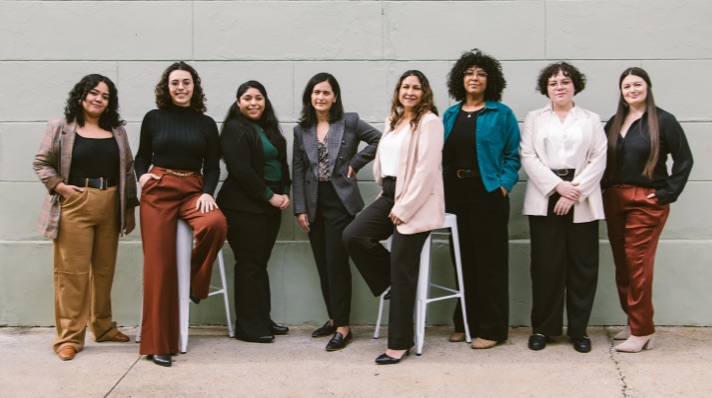Our Services
Culturally responsive, equity-centered research & strategy consulting
Actionable Research
EduDream offers rigorous mixed-methods actionable research to expand organizational knowledge and provide strategic clarity. Actionable research is solutions-oriented and takes into consideration the role of systems, culture, and context. Our research products and deliverables inform investment strategies, strategic plans, programmatic design, and broader organizational policies and practices.
Who it’s for
- Foundations looking to identify and analyze gaps in education research or product development
- Foundations seeking to understand what the field knows, or evidence, about a certain education topic, intervention, practice, or policy
- Non-profits seeking to gather evidence and data on key indicators within a state, school district, community, or school to inform strategic and programming decisions
- Non-profits or school districts looking to understand how program funds are allocated and identify strategies to ensure funds reach the highest opportunity areas
How it works
EduDream’s approach to research is equity-focused and systematic. Our team guides clients to clarify research goals and co-create clear and realistic research questions. We then conceptualize a research methodology and framework to guide research activities. Research projects typically involve identifying, gathering, and analyzing primary and/or secondary data to produce a literature review, evidence synthesis, data insights, or other research deliverables. Throughout the research process, we share emerging knowledge and learnings, equity considerations, and shortcomings to inform ongoing research activities.
Data Strategy
EduDream leverages data equity and collaborative approaches to guide clients in transforming their use of data to drive impact. We assess an organization’s data processes, procedures, and tools to identify key data sources and enhance methods for how data is collected, managed, stored, and used to measure impact and inform decision-making.
Who it’s for
- Education institutions or agencies seeking clarity on intended outcomes, impact measurement, and data collection processes and practices
- Education institutions or agencies looking to implement a new data tracking and reporting platform, including guidance and assistance migrating data to a new platform
- Foundations looking to identify best practices in measuring a certain education topic, intervention, practice, or policy
- Foundations seeking to support grantees with data capacity
Foundations seeking to understand the landscape of grantees’ data protocols and measurement best practices - Non-profits seeking a gap analysis of existing data collection processes to identify efficiencies
How it works
Our approach to data strategy is collaborative and equity-focused. Through facilitated conversations, critical feedback, targeted technical assistance, and co-creation, our team guides clients through a systematic process to clarify theories of change, conduct an audit of existing data processes, practices, and collection and measurement tools, and develop realistic outcomes and performance indicators that guide organizational efforts.
Program Evaluation
Our evaluation expertise includes designing mixed-methods, quasi-experimental evaluation plans, and executing learning, formative, and summative evaluations rooted in a culturally responsive and equitable evaluation (CREE) framework. We ensure evaluation processes, from outreach strategies to data collection and data analyses, are infused with cultural and linguistic competence. This means we actively welcome diverse perspectives, uplift the voices of stakeholders who are often overlooked or marginalized, adopt an asset-based approach, and facilitate learning among clients and community stakeholders.
Who it’s for
- Non-profits seeking a multi-year evaluation plan that outlines data collection and analysis plans, timeline, and budget
- Non-profits seeking a mixed-methods evaluation to understand the impact of programs and/or initiatives
- Foundations seeking to design and implement an evaluation plan to assess a grantee’s portfolio outcomes and inform continuous improvement planning
- Education institutions and agencies seeking primary data collection (e.g., focus groups, surveys, or interviews) and analysis to inform strategic planning, a policy, or portfolio investment
How it works
Evaluation projects typically begin with a discovery phase that focuses on building relationships with our client, and understanding goals and priorities. We then move into evaluation design and co-creation to develop a robust yet realistic evaluation plan that includes a data collection and analysis plan. We follow with data collection, which can include facilitating interviews and focus groups or creating and administering surveys. Data is synthesized using various methods to summarize and share comprehensive findings through accessible reports and presentations.
Needs Assessment
EduDream’s needs assessments are rooted in strengths and asset-based perspectives to better understand where and what resources could have the greatest positive impact on communities. We take a systematic approach to examine assets, opportunities, and needs within a community, whether a neighborhood, school, network of schools, district, county, or state.
Who it’s for
- Foundations seeking to identify community assets and resource gaps to inform future investments and initiatives
- Non-profits or school districts seeking to understand a growing school population or community more deeply to better serve its community members
- Non-profits seeking to understand the current landscape of education programs and services within a community, county, or state to inform new program development
- Non-profits or school districts seeking to identify barriers and pressing challenges to educational access and success within a specific community, county, or state in order to direct programs and resources to increase access
How it works
We take a multi-phased, systematic approach that typically combines mixed methods to understand the community. We collaborate with community organizers, leaders, and residents to identify assets and unmet community needs, and better understand where and what resources could have the greatest possible impact in driving desired educational outcomes. This work entails elevating community voice and engaging in a practice of co-creation with stakeholders through virtual and in-person settings.
Actionable Research
EduDream offers rigorous mixed-methods actionable research to expand organizational knowledge and provide strategic clarity. Actionable research is solutions-oriented and takes into consideration the role of systems, culture, and context. Our research products and deliverables inform investment strategies, strategic plans, programmatic design, and broader organizational policies and practices.
Who it’s for
- Foundations looking to identify and analyze gaps in education research or product development
- Foundations seeking to understand what the field knows, or evidence, about a certain education topic, intervention, practice, or policy
- Non-profits seeking to gather evidence and data on key indicators within a state, school district, community, or school to inform strategic and programming decisions
- Non-profits or school districts looking to understand how program funds are allocated and identify strategies to ensure funds reach the highest opportunity areas
How it works
EduDream’s approach to research is equity-focused and systematic. Our team guides clients to clarify research goals and co-create clear and realistic research questions. We then conceptualize a research methodology and framework to guide research activities. Research projects typically involve identifying, gathering, and analyzing primary and/or secondary data to produce a literature review, evidence synthesis, data insights, or other research deliverables. Throughout the research process, we share emerging knowledge and learnings, equity considerations, and shortcomings to inform ongoing research activities.
Data Strategy
EduDream leverages data equity and collaborative approaches to guide clients in transforming their use of data to drive impact. We assess an organization’s data processes, procedures, and tools to identify key data sources and enhance methods for how data is collected, managed, stored, and used to measure impact and inform decision-making.
Who it’s for
- Education institutions or agencies seeking clarity on intended outcomes, impact measurement, and data collection processes and practices
- Education institutions or agencies looking to implement a new data tracking and reporting platform, including guidance and assistance migrating data to a new platform
- Foundations looking to identify best practices in measuring a certain education topic, intervention, practice, or policy
- Foundations seeking to support grantees with data capacity
Foundations seeking to understand the landscape of grantees’ data protocols and measurement best practices - Non-profits seeking a gap analysis of existing data collection processes to identify efficiencies
How it works
Our approach to data strategy is collaborative and equity-focused. Through facilitated conversations, critical feedback, targeted technical assistance, and co-creation, our team guides clients through a systematic process to clarify theories of change, conduct an audit of existing data processes, practices, and collection and measurement tools, and develop realistic outcomes and performance indicators that guide organizational efforts.
Program Evaluation
Our evaluation expertise includes designing mixed-methods, quasi-experimental evaluation plans, and executing learning, formative, and summative evaluations rooted in a culturally responsive and equitable evaluation (CREE) framework. We ensure evaluation processes, from outreach strategies to data collection and data analyses, are infused with cultural and linguistic competence. This means we actively welcome diverse perspectives, uplift the voices of stakeholders who are often overlooked or marginalized, adopt an asset-based approach, and facilitate learning among clients and community stakeholders.
Who it’s for
- Non-profits seeking a multi-year evaluation plan that outlines data collection and analysis plans, timeline, and budget
- Non-profits seeking a mixed-methods evaluation to understand the impact of programs and/or initiatives
- Foundations seeking to design and implement an evaluation plan to assess a grantee’s portfolio outcomes and inform continuous improvement planning
- Education institutions and agencies seeking primary data collection (e.g., focus groups, surveys, or interviews) and analysis to inform strategic planning, a policy, or portfolio investment
How it works
Evaluation projects typically begin with a discovery phase that focuses on building relationships with our client, and understanding goals and priorities. We then move into evaluation design and co-creation to develop a robust yet realistic evaluation plan that includes a data collection and analysis plan. We follow with data collection, which can include facilitating interviews and focus groups or creating and administering surveys. Data is synthesized using various methods to summarize and share comprehensive findings through accessible reports and presentations.
Needs Assessment
EduDream’s needs assessments are rooted in strengths and asset-based perspectives to better understand where and what resources could have the greatest positive impact on communities. We take a systematic approach to examine assets, opportunities, and needs within a community, whether a neighborhood, school, network of schools, district, county, or state.
Who it’s for
- Foundations seeking to identify community assets and resource gaps to inform future investments and initiatives
- Non-profits or school districts seeking to understand a growing school population or community more deeply to better serve its community members
- Non-profits seeking to understand the current landscape of education programs and services within a community, county, or state to inform new program development
- Non-profits or school districts seeking to identify barriers and pressing challenges to educational access and success within a specific community, county, or state in order to direct programs and resources to increase access
How it works
We take a multi-phased, systematic approach that typically combines mixed methods to understand the community. We collaborate with community organizers, leaders, and residents to identify assets and unmet community needs, and better understand where and what resources could have the greatest possible impact in driving desired educational outcomes. This work entails elevating community voice and engaging in a practice of co-creation with stakeholders through virtual and in-person settings.
Featured Projects







